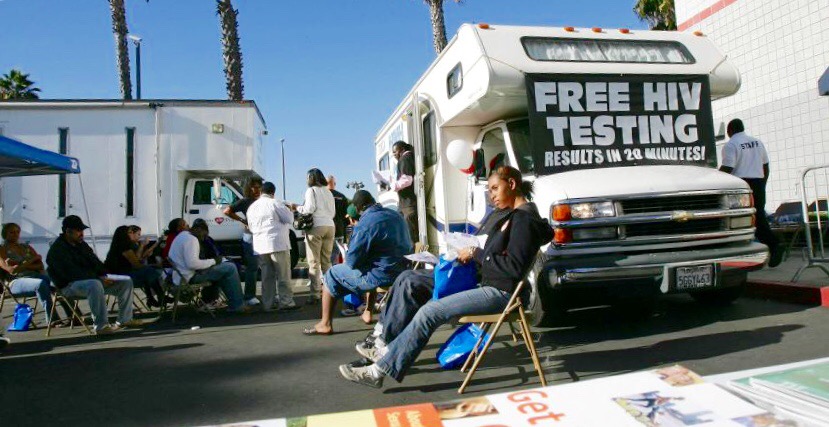This summer, HBO brought a film adaptation of Larry Kramer’s celebrated play The Normal Heart to living rooms across America. The film told the tale of Ned Weeks, a gay man living in New York in the 1980s. To a young gay man today, Weeks might as well have been on Mars—or in hell. As AIDS began to ravage his group of friends and lovers, his world crumbled. Death haunted everyone, and it seemed as if nothing could be done.
Today’s headline-grabbing gay struggles are for same-sex marriage and greater legal protection, so you could be excused for thinking the battle against HIV/AIDS in America has been won. But, in fact, we’re still stuck in the trenches. While HIV infection is no longer a death sentence, Americans continue to become infected, at a rate of 50,000 per year. If nothing were to change, a half-million more Americans would be HIV positive by 2024.
This was one reason the Food and Drug Administration in 2012 approved a novel new method of preventing HIV transmission, known as “pre-exposure prophylaxis,” or PrEP. The program involves taking an HIV medication, currently a once-a-day pill called Truvada, in order to prevent HIV infection. Researchers estimate that PrEP is over 90 percent effective if taken as prescribed. The PrEP program also calls for screenings for HIV and sexually transmitted infections at three-month intervals. This addresses a challenge doctors have struggled with for years: keeping at-risk people in contact with medical care for regular testing and rapid treatment.
But despite its promise, PrEP has generated significant controversy in the LGBT and public health communities. Some decry the “Truvada whores” who want the pill only because it will allow them to more safely “bareback,” a negative term referring to men who do not use condoms. Others fear the spread of drug-resistant strains of HIV. And still others worry that abandoning the condoms-or-die messaging developed in the 1980s will invite yet another plague that will again ravage the gay community.
It wasn’t easy getting gay men to use condoms in the first place. Despite the evidence that condoms reduce the risk of a slew of sexually transmitted infections, and they’re cheap and easy to obtain, many people do not like to use them. It took tragedy to develop the condom culture that exists today. “It’s a bit of a wives’ tale that my generation started using condoms just because we developed safe-sex literature and gave out pamphlets,” said Peter Staley, a veteran AIDS activist from ACT UP New York. “It wasn’t the pamphlets that made us start using condoms, it was the fact that our friends were dying.”
The AIDS plague transformed gay men’s condom use into a sacred, life-or-death choice, and those who did not practice sex with condoms were stigmatized. But the younger generation is different. Today, few gay men see anyone dying from AIDS, so condom use is declining. Condoms help prevent HIV transmission only if they are used for the duration of every single act of intercourse—and according to studies from the Centers for Disease Control and Prevention (CDC), only one in six gay men reports doing that. It is this group that is driving the ongoing HIV health crisis. Young men who have sex with men (MSM) represent a tiny fraction of the country’s population, but make up over a quarter of all new HIV infections. And that number is growing: There was a 22 percent jump between 2008 and 2010 (the most recent year for which there is solid data). This younger group’s growing infection rate is offsetting reductions in infections in other MSM subgroups. And more than half of these young men don’t know they are positive.
Keep Reading








 TrafficHolder.com - Buy & Sell Adult Traffic
TrafficHolder.com - Buy & Sell Adult Traffic
[…] This was one reason the Food and Drug Administration in 2012 approved a novel new method of preventing HIV transmission, known as “pre-exposure prophylaxis,” or PrEP. The program involves taking an HIV medication, currently a once-a-day pill called Truvada, in order to prevent HIV infection. Researchers …read more […]
[…] The Pill Truvada Can Prevent HIV/AIDS, and for Some, That’s a Problem […]
I’ve looked at enough of those studies to know the numbers are not as promising as they sound at first. The additional danger for those in the industry is that companies involved in making gay porn, while defending the sanctity of their nearly industry wide policy of “No Testing” because it amounts to a shaming of sorts, are going around saying these drugs are completely effective at stopping HIV. Even if you take manufacturer claims with a grain of salt, none of the small scale studies suggest the drugs are perfect even when used perfectly. Just as women using “the… Read more »